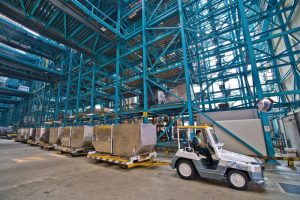Hong Kong Retains Title as the Leading Air Cargo Hub
For the 13th consecutive year, Hong Kong International Airport maintains its position as the forefront leader in air cargo, solidifying its status as the premier cargo hub.
Last year, Hong Kong International Airport (HKIA) was ranked as the world’s busiest air cargo hub, despite its volumes falling by 16.5% to 4.2m tons.
The fall was the third largest amongst the world’s leading 20 cargo hubs – Shanghai PVG and Dubai DXB were the only ones to report bigger drops – as Covid restrictions on travellers and workers limited airline operations.
Air Cargo Update’s Associate Publisher, Poonam Chawla, seized the opportunity to delve into the intricacies of this remarkable achievement with Wilson Kwong, Chief Executive of Hactl.
In an insightful conversation at the Caspian Air Cargo Summit, the factors contributing to HKIA’s continued success, its strategies for navigating the challenges posed by the pandemic, and its plans as a pivotal player in the air cargo industry were discussed.
Is Hong Kong really the air cargo gateway of the world? Could you explain in numbers – tonnage handled, investments in technology, revenue growth, etc?
Based on Airports Council International figures, which are universally accepted, Hong Kong has been the number one cargo hub for 13 of the past 14 years. Throughput in 2022 was 4.2M tons.
We cannot speak for other handlers, but Hactl continues to invest heavily in making its business more efficient and more sustainable, providing ever better service standards, and in offering a wider scope of services. To mention just a few examples over just the past year, Hactl has opened a new Cool Zone for temperature-sensitive e-commerce shipments handled through its Hacis subsidiary; it has improved aviation safety measures by initiating sniffer dogs to detect undeclared lithium batteries; it has strengthened airside security by adding security robots to its patrols; it is about to introduce driverless towing tractors to transport cargo on the ramp; it has designed and built a new “Animal Limo” ramp transfer vehicle to protect live animals being moved from aircraft to the terminal; it is opening 12 new automated check-in kiosks to speed customer processing; and it has stepped up its sustainability measures with numerous environmental initiatives, and actions to create a more inclusive, fair, safe and enjoyable working environment for staff.
Despite cargo volumes decreasing year on year at airports throughout the world, you have retained the number 1 spot, how have you managed this, particularly when HKG handled 4.2 million metric tons in 2022, down 16.5% from 2021?
The entire air cargo world has experienced a downturn in 2023, largely due to geopolitical tensions and economic headwinds.
Hong Kong has fared better than most, and retained its leading slot, simply because of its strategic roles as the gateway between China and the world, and as the distribution centre for Asia.
These roles are underpinned by its strong work ethic, its investment in infrastructure at the airport and in the surrounding area, its bilingual workforce, its modern trade-friendly Customs regime, its unparalleled global air connections, and its wide choice of freighter operators supported by specialist freighter handling resources.
What are the reasons for the cargo tonnage volumes coming down? And how are you doing in 2023?
As previously mentioned, the entire world of air cargo has experienced a downturn in 2023, largely due to geopolitical tensions and economic headwinds that are beyond our control. But the decline has levelled off, things are looking much more positive for the remainder of this year, and we expect to return to modest growth in 2024.
What is the dwell time of air cargo at your terminal, any efforts to bring it down further since your investment in automation is high?
Our standard Service Level Agreements provide a contractual base but, in practice, we can achieve much shorter dwell times where required. This is thanks to the many measures we have put in place, such as priority unloading of express- and temperature-sensitive cargo; the introduction of automated check-in kiosks to reduce queuing at manually-served counters; fast- lane parking for pre-booked vehicles; and pre-allocation of truck slots via our mobile app.
Are you fully automated, if not what areas still need automation? What new automation has been at work at HACTL? How do you expect the recent introduction of security robots to enhance Hactl’s security measures and overall operational efficiency?
Hactl is probably the most automated cargo handling operation in the world; but there is still scope to automate repetitive tasks and free our staff for more productive duties. We are about to introduce driverless ramp tractors to tow cargo, initially between our terminal and ULD handling centre, and ultimately between aircraft and the terminal. Beyond that, we are looking at how to tackle the long- recognised challenge of automating pallet build-up.
Our new security robots complement existing human patrols, freeing them up to respond more quickly to any emergency or incident. The robots always have the added benefit of recording video. This will also help in monitoring cargo condition, providing visual evidence which will be useful in dealing with any damage claims.
Could you tell us about some of your technology investments and how it has helped the terminal improve efficiencies, and drive business growth?
Hactl’s entire innovation journey is driven by our Performance Enhancement team, who proactively seek out any inefficiencies and provide tech-led solutions. They have solved many issues over recent years and made a major contribution to the efficiency of our operations. There are simply too many examples to list, but two recent illustrations are:
1 – Our new e-Loading regime, which is a digital replacement for an old paper-based process. A new eLoading Instruction syncs with the ramp team’s mobile devices, providing real-time updates to the Load Plan, and feeding back loading progress. The system enables verification of airline instructions against the flight manifest, highlighting any discrepancies. eLoading eliminates all unnecessary travel between the aircraft and Load Control. The new system also records the parking location of each ULD on the ramp, listing them in the correct loading order, which significantly reduces the time taken. eLoading also facilitates a Final Check of all cargo to ensure all planned cargo has been loaded and is on the correct flight.
2 – The 12 new ASKs (Automated Service Kiosks), at which agents present their Shipment Release Form and ID. The system automatically authenticates their ID, and the SRF’s validity is also checked. The details of the shipment collection are recorded, and the physical release of the cargo is then automatically triggered via COSAC-Plus. The kiosks can also deal with unitised cargo shipments.
Hactl’s commitment to sustainability is evident through its participation in the new BEC Net- zero Carbon Charter. How does the Green Terminal program align with your broader Sustainability Strategy Framework, and what impact do you expect these initiatives to have on your operations and the industry?
Hactl made a public commitment to SBTi in 2022. SBTi is a collaboration between CDP, the United Nations Global Compact, World Resources Institute (WRI) and the World Wide Fund for Nature (WWF); it is also one of the We Mean Business Coalition commitments. The SBTi defines and promotes best practice in science-based target setting, offers resources and guidance to reduce barriers to adoption, and independently assesses and approves companies’ targets.
Over the ensuing 18 months, Hactl’s Safety, Sustainability and Quality Assurance team has been working on setting targets, based on the SBTi criteria. Hactl has now committed to reduce absolute scope 1 and 2 GHG (greenhouse gas) emissions by 50.4% by 2030, from a 2018 base line. The company also commits to reduce absolute scope 3 GHG emissions from purchased goods and services, fuel- and energy-related activities, waste generated in operations, employee commuting and downstream leased assets by 50.4% within the same timeframe. The target boundary includes land-related emissions and removals from bioenergy feedstocks.
To ensure maximum transparency, accountability, and corporate leadership, Hactl is required to publicly report progress against its targets on an annual basis, along with its company-wide GHG emissions inventory.
Among the many measures Hactl will employ to achieve Hactl’s SBTi targets, are replacing internal combustion-powered vehicles and ground support equipment (GSE) with electric versions; procuring Renewable Energy Certificates (RECs); increasing the use of energy efficient lighting and heating, ventilation and air conditioning (HVAC) systems; working with suppliers to reduce Hactl’s upstream emissions, especially from purchased goods and services; implementing digital management systems to eliminate paper use; and devising innovative ways of diverting wood, paper, plastics, and mixed waste from landfill.
We regard Sustainability as an essential aspect of business today. We hope that Hactl’s strong progress in this area will inspire others in the industry to follow suit.
Congratulations on receiving the ‘Best Global Air Cargo Terminal Operator’ and ‘Best Green Air Cargo Terminal Operator’ awards at the 2023 AFLAS Awards. What strategies and initiatives do you believe set Hactl apart and have contributed to this remarkable recognition, and how will these achievements impact your future business endeavors?
Thank you! The AFLAS awards aim to recognize leadership, consistency in service quality, innovation, customer-relationship management and reliability among industry service providers. We were short-listed by the organiser, having satisfied their pre-determined criteria, and then were chosen to receive these awards based on voting by the 15,000+ readers of Asia Cargo News. Recognition of this kind is always flattering and helps to convince potential customers of the strong service offering we provide.
As a leader in the industry, how does Hactl view the evolving landscape of air cargo and logistics on a global scale, and what strategies are in place to adapt to these changes?
COVID-19 underscored the vital role of air cargo in global trade and logistics. While the industry is a barometer of world trade and echoes its ups and downs, air cargo is a vital component that is here to stay. But we must be mindful of our impact on the planet, and Hactl is therefore doing all it can to mitigate this through its Green Terminal programme. Digitalisation and automation are an inherent part of this, delivering new efficiencies and cutting waste. As is so often the case, what is good for the environment is also good for our business. We try to set examples that others can, and want to, follow.





